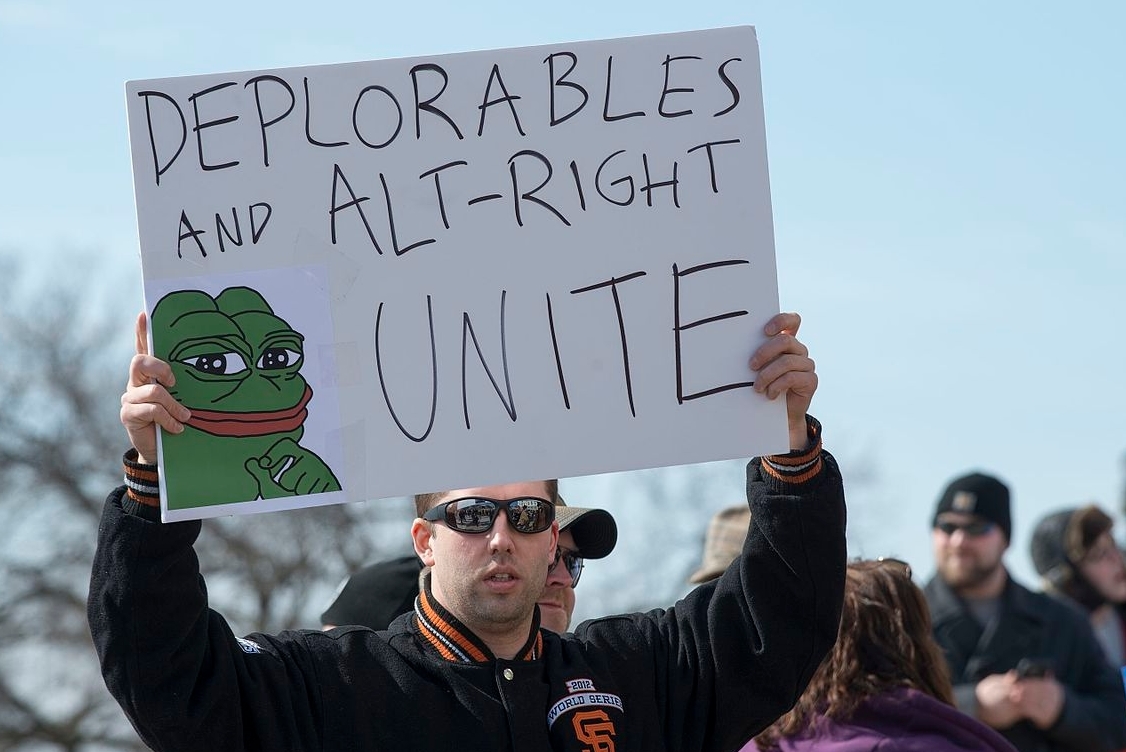
Here’s the rest of the story...
On August 14, 2017, Robin Wright of the New Yorker penned the followind article, “Is America Headed for a New Kind of Civil War?”
Excerpts:
“A day after the brawling and racist brutality and deaths in Virginia, Governor Terry McAuliffe asked, “How did we get to this place?” The more relevant question after Charlottesville—and other deadly episodes in Ferguson, Charleston, Dallas, St. Paul, Baltimore, Baton Rouge, and Alexandria—is where the United States is headed. How fragile is the Union, our republic, and a country that has long been considered the world’s most stable democracy? The dangers are now bigger than the collective episodes of violence. “The radical right was more successful in entering the political mainstream last year than in half a century,” the Southern Poverty Law Center reported in February (2017). The organization documents more than nine hundred active (and growing) hate groups in the United States.”
“America’s stability is increasingly an undercurrent in political discourse. Earlier this year, I began a conversation with Keith Mines about America’s turmoil. Mines has spent his career—in the U.S. Army Special Forces, the United Nations, and now the State Department—navigating civil wars in other countries, including Afghanistan, Colombia, El Salvador, Iraq, Somalia, and Sudan. He returned to Washington after sixteen years to find conditions that he had seen nurture conflict abroad now visible at home. It haunts him. In March, Mines was one of several national-security experts whom Foreign Policy asked to evaluate the risks of a second civil war—with percentages. Mines concluded that the United States faces a sixty-per-cent chance of civil war over the next ten to fifteen years. Other experts’ predictions ranged from five per cent to ninety-five per cent. The sobering consensus was thirty-five per cent. And that was five months before Charlottesville.”
““We keep saying, ‘It can’t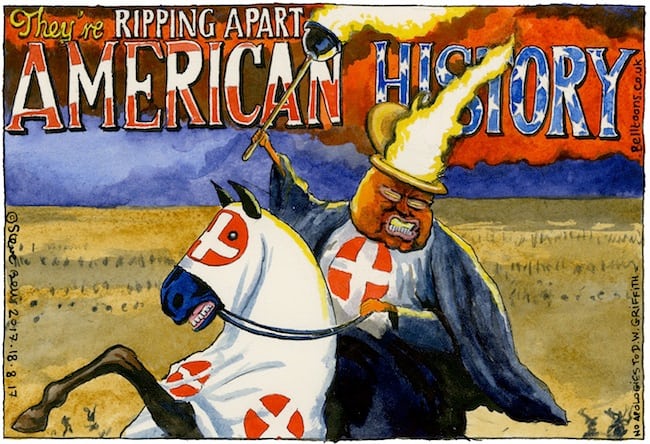 happen here,’ but then, holy smokes, it can,” Mines told me after we talked, on Sunday, about Charlottesville. The pattern of civil strife has evolved worldwide over the past sixty years. Today, few civil wars involve pitched battles from trenches along neat geographic front lines. Many are low-intensity conflicts with episodic violence in constantly moving locales. Mines’s definition of a civil war is large-scale violence that includes a rejection of traditional political authority and requires the National Guard to deal with it. On Saturday, McAuliffe put the National Guard on alert and declared a state of emergency.”
happen here,’ but then, holy smokes, it can,” Mines told me after we talked, on Sunday, about Charlottesville. The pattern of civil strife has evolved worldwide over the past sixty years. Today, few civil wars involve pitched battles from trenches along neat geographic front lines. Many are low-intensity conflicts with episodic violence in constantly moving locales. Mines’s definition of a civil war is large-scale violence that includes a rejection of traditional political authority and requires the National Guard to deal with it. On Saturday, McAuliffe put the National Guard on alert and declared a state of emergency.”
“Based on his experience in civil wars on three continents, Mines cited five conditions that support his prediction: entrenched national polarization, with no obvious meeting place for resolution; increasingly divisive press coverage and information flows; weakened institutions, notably Congress and the judiciary; a sellout or abandonment of responsibility by political leadership; and the legitimization of violence as the “in” way to either conduct discourse or solve disputes.”
 “President Trump “modeled violence as a way to advance politically and validated bullying during and after the campaign,” Mines wrote in Foreign Policy. “Judging from recent events the left is now fully on board with this,” he continued, citing anarchists in anti-globalization riots as one of several flashpoints. “It is like 1859, everyone is mad about something and everyone has a gun.”
“President Trump “modeled violence as a way to advance politically and validated bullying during and after the campaign,” Mines wrote in Foreign Policy. “Judging from recent events the left is now fully on board with this,” he continued, citing anarchists in anti-globalization riots as one of several flashpoints. “It is like 1859, everyone is mad about something and everyone has a gun.”
“To test Mines’s conjecture, I reached out to five prominent Civil War historians this weekend. “When you look at the map of red and blue states and overlap on top of it the map of the Civil War—and who was allied with who in the Civil War—not much has changed,” Judith Giesberg, the editor of the Journal of the Civil War Era and a historian at Villanova University, told me. “We never agreed on the outcome of the Civil War and the direction the country should go in. The postwar amendments were highly contentious—especially the Fourteenth Amendment, which provides equal protection under the law—and they still are today. What does it mean to deliver voting rights to people of color? We still don’t know.”
 “She added, “Does that make us vulnerable to a repeat of the past? I don’t see a repeat of those specific circumstances. But that doesn’t mean we are not entering something similar in the way of a culture war.”
“She added, “Does that make us vulnerable to a repeat of the past? I don’t see a repeat of those specific circumstances. But that doesn’t mean we are not entering something similar in the way of a culture war.”
“Anxiety over deepening schisms and new conflict has an outlet in popular culture: in April, Amazon selected the dystopian novel “American War”—which centers on a second U.S. civil war—as one of its best books of the month. In a review in the Washington Post, Ron Charles wrote, “Across these scarred pages rages the clash that many of us are anxiously speculating about in the Trump era: a nation riven by irreconcilable ideologies, alienated by entrenched suspicions . . . both poignant and horrifying.” The Times book reviewer noted, “It’s a work of fiction. For the time being, anyway.” The book’s author, Omar El Akkad, was born in Egypt and covered the war in Afghanistan, the Arab Spring, and the Ferguson protest as a journalist for Canada’s Globe and Mail.”
 “Before Charlottesville, David Blight, a Yale historian, was already planning a conference in November on “American Disunion, Then and Now.” “Parallels and analogies are always risky, but we do have weakened institutions and not just polarized parties but parties that are risking disintegration, which is what happened in the eighteen-fifties,” he told me. “Slavery tore apart, over fifteen years, both major political parties. It destroyed the Whig Party, which was replaced by the Republican Party, and divided the Democratic Party into northern and southern parts.”
“Before Charlottesville, David Blight, a Yale historian, was already planning a conference in November on “American Disunion, Then and Now.” “Parallels and analogies are always risky, but we do have weakened institutions and not just polarized parties but parties that are risking disintegration, which is what happened in the eighteen-fifties,” he told me. “Slavery tore apart, over fifteen years, both major political parties. It destroyed the Whig Party, which was replaced by the Republican Party, and divided the Democratic Party into northern and southern parts.”
“In the eighteen-fifties, Blight told me, Americans were not good at foreseeing or absorbing the “shock of events,” including the Fugitive Slave Act, the Supreme Court’s Dred Scott decision, the John Brown raid, and even the Mexican-American War. “No one predicted them. They forced people to reposition themselves,” Blight said. “We’re going through one of those repositionings now. Trump’s election is one of them, and we’re still trying to figure it out. But it’s not new. It dates to Obama’s election. We thought that would lead culture in the other direction, but it didn’t,” he said. “There was a tremendous resistance from the right, then these episodes of police violence, and all these things [from the past] exploded again. It’s not only a racial polarization but a seizure about identity.”
“Generally, Blight added, “We know we are at risk of civil war, or something like it, when an election, an enactment, an event, an action by government or people in high places, becomes utterly unacceptable to a party, a large group, a significant constituency.” The nation witnessed tectonic shifts on the eve of the Civil War, and during the civil-rights era, the unrest of the late nineteen-sixties and the Vietnam War, he said. “It did not happen with Bush v. Gore, in 2000, but perhaps we were close.”
 “In a reversal of public opinion from the nineteen-sixties, Blight said, the weakening of political institutions today has led Americans to shift their views on which institutions are credible. “Who do we put our faith in today? Maybe, ironically, the F.B.I.,” he said. “With all these military men in the Trump Administration, that’s where we’re putting our hope for the use of reason. It’s not the President. It’s not Congress, which is utterly dysfunctional and run by men who spent decades dividing us in order to keep control, and not even the Supreme Court, because it’s been so politicized.”
“In a reversal of public opinion from the nineteen-sixties, Blight said, the weakening of political institutions today has led Americans to shift their views on which institutions are credible. “Who do we put our faith in today? Maybe, ironically, the F.B.I.,” he said. “With all these military men in the Trump Administration, that’s where we’re putting our hope for the use of reason. It’s not the President. It’s not Congress, which is utterly dysfunctional and run by men who spent decades dividing us in order to keep control, and not even the Supreme Court, because it’s been so politicized.”
“In the wake of Charlottesville, the chorus of condemnation from politicians across the political spectrum has been encouraging, but it is not necessarily reassuring or an indicator about the future, Gregory Downs, a historian at the University of California at Davis, told me. During the Civil War, even Southern politicians who denounced or were wary of secession for years—including Jefferson Davis—ended up as leaders of the Confederacy. “If the source of conflict is deeply embedded in cultural or social forces, then politicians are not inherently able to restrain them with calls for reason,” Downs said. He called the noxious white supremacists and neo-Nazis the “messengers,” rather than the “architects,” of the Republic’s potential collapse. But, he warned, “We take our stability for granted.”

“He dug out for me a quote from the journalist Murat Halstead’s book “The War Claims of the South,” published in 1867. “The lesson of the war that should never depart from us,” Halstead wrote, “is that the American people have no exemption from the ordinary fate of humankind. If we sin, we must suffer for our sins, like the Empires that are tottering and the Nations that have perished.”
“Eric Foner, the Columbia University historian, won the Pulitzer Prize, in 2011, for his book “The Fiery Trial: Abraham Lincoln and American Slavery.” Like the other scholars I spoke to, Foner is skeptical that any future conflict will resemble America’s last civil war. “Obviously, we have some pretty deep divisions along multiple lines—racial, ideological, rural versus urban,” he told me. “Whether they will lead to civil war, I doubt. We have strong gravitational forces that counteract what we’re seeing today.” He pointed out that “the spark in Charlottesville—taking down a statue of Robert E. Lee—doesn’t have to do with civil war. People are not debating the Civil War. They’re debating American society and race today.”
“Charlottesville was not the first protest by the so-called alt-right, nor will it be the last. Nine more rallies are planned for next weekend and others in September.”
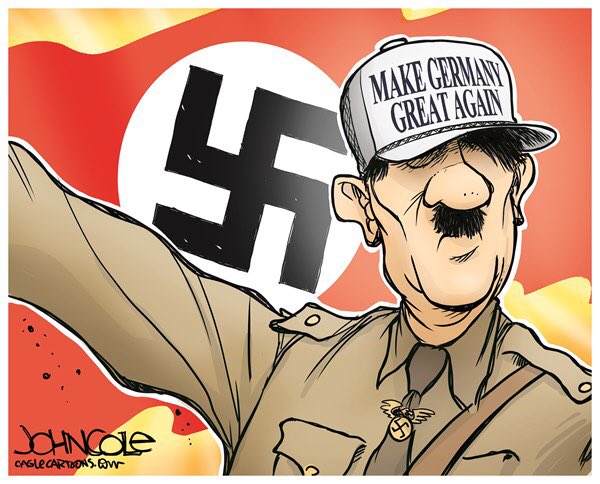
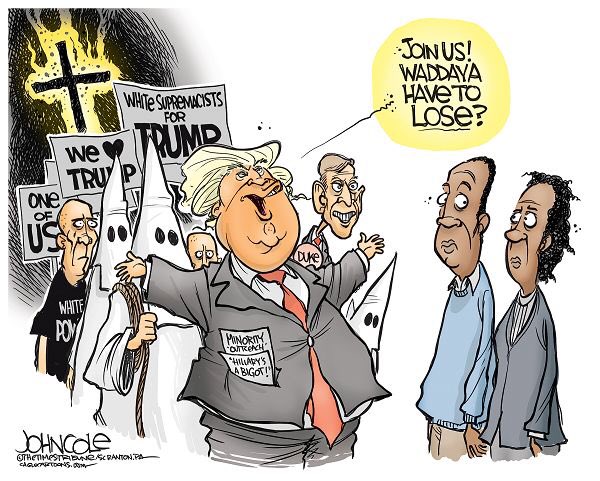
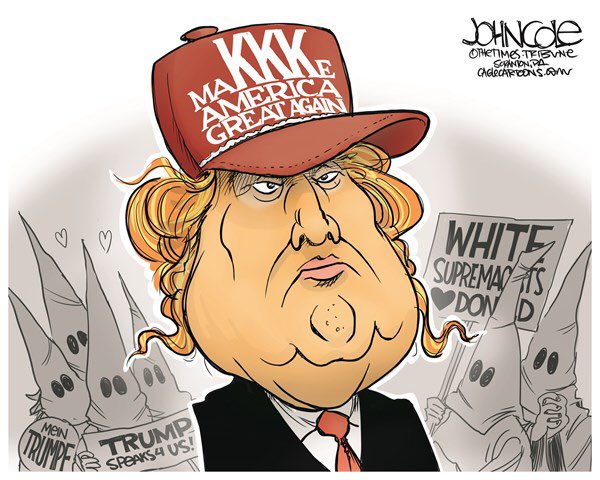
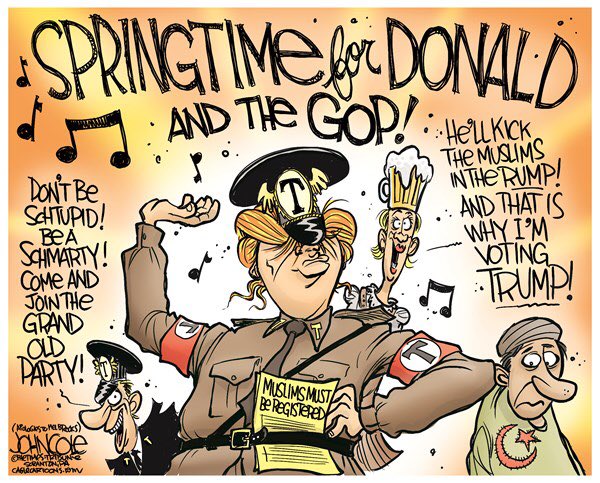
Gronda, I understand where this is coming from, but I don’t fear another Civil War. I do fear civil unrest, though. With the exception of the man in the White House, leaders are beginning to take notice. Now, they need to act. Keith
LikeLiked by 1 person
Gronda, thx for sharing these cartoons! Secondly, I agree with Keith, another civil war is highly improbable. Most of this talk is flamed by our sensationalist media to spread fear. The majority of (sane) liberals and conservatives are peace loving, respectful, law abiding citizens who do not believe in this extreme ideology from the alt-left/ right. The majority are not willing to fight and die for the radical fringe’s inane beliefs.
I also agree that Trump should play a larger role in moderating these extremists, not take sides, and calm this situation down. Sadly he’s not a true statesman, and may be incapable of reasonable action.
Mr. President, do you job and unite this country!
LikeLike
Dear !EarthUnited,
The president has already made the decision towards division. No, a civil war is not likely, but the divisions along racial fault lines that the president has been stoking, can be laid at his feet. His actions belie his words and barring an intervention from above, he is not about to change to become the president for all of us.
And I must respectfully disagree with any attempts to equate the neo-Nazis, the White supremacists, the White nationalists, the racists with those opposing them from the left. This in my mind is an attempt to white wash the hate from the alt-right hate groups and I am not buying it. My mind is definitely closed on this point.
Hugs, Gronda
LikeLike
Oh sorry, you misunderstand. I’m not equating the hatred and bigotry of Nazis/ White Supremacists with the Alt-Left. I’m just pointing out both sides’ radical POV, and how they are not representative of the majority of politically moderate Americans.
While the Alt-Left does not engage in racism or bigotry, they nevertheless are violent and oppose free speech. If you do not agree with their dogmatic ideology, you are their enemy, no discussion possible. Example:
UC Berkeley riots: Violence looms as mayor questioned over ties to extremist group….
http://www.foxnews.com/politics/2017/04/25/uc-berkeley-riots-violence-looms-as-mayor-questioned-over-ties-to-extremist-group.html
LikeLike
Dear !EarthUnited,
I still continue to respectfully disagree. Here’s the difference. The far left themselves are sitting on the minority of those on the left who want to act out. I know this because I have attended Democratic meetings that specifically denounce this activity. There is a policy not to respond to the alt right hate groups in kind. It is NOT CONDONED.
Those who march along with neo-Nazis with their regalia and hate chants cannot claim innocence. In short, I do not see the alt-right groups sitting on any protesters in their marches, preventing them from doing acts of violence.
There IS NO EQUIVALENCY AT ANY LEVEL AND I GIVE NO CREDENCE TO FOX NEWS ON THIS ISSUE. This is the same news outlet which had all their pundits specifically decrying the Black Lives Matter movement as a hate group without any objective context. But where were these same pundits when their guests where questioning President Obama’s US citizenship. They were mum.
I do not categorize the professionals like Chis Wallace and Shepherd Smith with this Fox group of punditry.
Hugs, Gronda
LikeLike
While i agree with you, there is no moral equivalency when it comes to the alt-right’s hateful affiliation. However both sides are to blame for inflaming the incident at Charlottesville. If Antifa wasn’t there, i’m sure that young lady would still be here and 19 ppl would not be injured. Gronda, it takes 2 to tango, you can’t criticize the right while giving a pass to the left, both are complicit.
Here’s a more balanced piece from the Guardian: ‘Alt-right’, ‘alt-left’ – the rhetoric of hate after Charlottesville.
What’s the difference between a Nazi and a white supremacist, antifa and alt-left? Steven Poole deconstructs the new political discourse.
https://www.theguardian.com/books/2017/aug/18/steven-poole-words-charlottesville-alt-right-alt-left
LikeLike
Dear Keith,
I am praying that leaders who have the power to remove DDT from doing further harm, will begin to act.
Hugs, Gronda
LikeLike
While I agree that a civil war is unlikely, I definitely see what I refer to as ‘the great divide’ in this country growing ever wider. Trump & Co. do nothing to help heal the division, but rather seem determined to encourage more hatred, as he did at his inappropriate campaign-style rally in Phoenix. 267 days after the election, we still see people chanting “lock her up” … apparently Trump never plans to move forward, to leave the past behind. I am with you, Gronda … the only solution I see is to remove this hateful buffoon from office quickly, before he destroys everything that was ever of value in this nation. Hugs!!!
LikeLiked by 1 person
Dear Jill,
I am in 100% agreement with your thinking.
The reality is that there is no way to cover up the fact that DDT is catering to the racists in his base because he wants their support. It matters little that he is doing real harm to this country.
There is no way I am letting anyone get away with equating the racst haters with those opposing them. There is no coloring of the waters for me. There are no republican talking points that will whitewash the president’s attitude and words on this issue.
Hugs, Gronda
LikeLiked by 1 person
I fully agree! His racist attitudes and verbiage go back to his early days in business when he discriminated against black employees and also refused to rent property to blacks. He has not changed … except, perhaps, to become an even bigger bigot. Hugs!!!
LikeLiked by 1 person